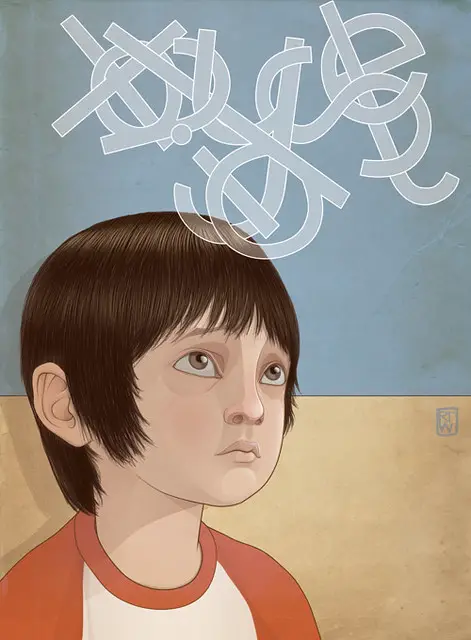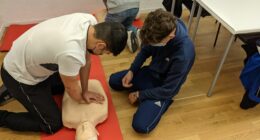Dyslexia affects a person’s ability to read and spell words, while dyscalculia impacts their understanding of numbers and mathematics. While both of these conditions can be challenging for the person affected by them, they can also be managed with the right support and accommodations.
What is dyslexia?
(Photo By david banes on flickr)

Dyslexia is a neurological condition that affects a person’s ability to read, write, and spell. It is a learning disorder that affects the way the brain processes written and spoken language. Individuals with dyslexia may have difficulty reading fluently and may struggle to understand written text, even though they may have normal or above-average intelligence.
Dyslexia is not related to a lack of intelligence or motivation, and it is not caused by poor vision. It is a lifelong condition that can be managed with appropriate interventions and support. Some common signs of dyslexia include difficulty with phonemic awareness (the ability to identify and manipulate sounds in words), reading comprehension, spelling, and writing.
What is dyscalculia?
Dyscalculia is a learning disorder that affects a person’s ability to understand and work with numbers. It is often referred to as “math dyslexia”. People with dyscalculia may have difficulty with tasks such as performing arithmetic operations, understanding mathematical concepts, and applying math skills to real-world situations.
Individuals with dyscalculia may struggle with basic math concepts such as number sense, counting, and recognizing patterns. They may also have difficulty with more complex math skills such as algebra, geometry, and calculus.
Dyscalculia is not related to a lack of intelligence or motivation, and it is not caused by a lack of education or exposure to math. It is a neurological condition that affects the way the brain processes numerical information. Like dyslexia, dyscalculia is a lifelong condition that can be managed with appropriate interventions and support.
Dyslexia Vs. Dyscalculia – Key differences
Dyslexia and dyscalculia are both learning disorders that affect different areas of learning. While dyslexia primarily affects a person’s ability to read, write, and spell, dyscalculia affects a person’s ability to understand and work with numbers. Here are some key differences between dyslexia and dyscalculia:
Area of Difficulty: Dyslexia affects reading, writing, and spelling, while dyscalculia affects math skills, including arithmetic, geometry, and algebra.
Processing: Dyslexia affects the way the brain processes written and spoken language, while dyscalculia affects the way the brain processes numerical information.
Symptoms: Dyslexia symptoms may include difficulty with phonemic awareness, reading comprehension, spelling, and writing. Dyscalculia symptoms may include difficulty with number sense, counting, and recognizing patterns.
Diagnosis: Dyslexia and dyscalculia are both diagnosed through a comprehensive evaluation that includes testing and observation by a qualified professional.
Intervention: Both dyslexia and dyscalculia can be managed with appropriate interventions and support. Interventions for dyslexia may include specialized reading instruction, accommodations, and assistive technology. Interventions for dyscalculia may include specialized math instruction, accommodations, and assistive technology.
It is important to note that individuals can have both dyslexia and dyscalculia, as these are two separate conditions that can occur independently or together.
Symptoms of Dyslexia and Dyscalculia
Here are some common symptoms of dyslexia:
- Difficulty with phonemic awareness, including the ability to identify and manipulate sounds in words.
- Difficulty with reading fluency, accuracy, and comprehension.
- Difficulty with spelling and written expression.
- Difficulty with word retrieval and vocabulary.
- Difficulty with time management, organization, and following multi-step instructions.
- Struggles with reading aloud and decoding unfamiliar words.
- Difficulty with memorizing and recalling information.
- Difficulty with handwriting and fine motor skills.
Here are some common symptoms of dyscalculia:
- Difficulty with number sense, including understanding numerical quantities and relationships.
- Difficulty with basic arithmetic operations such as addition, subtraction, multiplication, and division.
- Difficulty with recognizing and working with patterns and sequences.
- Difficulty with solving word problems and applying math concepts to real-world situations.
- Struggles with telling time, counting money, and understanding measurements.
- Difficulty with mental math and estimating.
- Difficulty with spatial reasoning and geometry.
- Difficulty with memorizing and recalling math facts.
It is important to note that the symptoms of dyslexia and dyscalculia can vary widely between individuals, and that a comprehensive evaluation by a qualified professional is necessary for an accurate diagnosis.
Treatment for Dyslexia and Dyscalculia
There is no known cure for dyslexia or dyscalculia, but both conditions can be managed with appropriate interventions and support. Here are some common treatments for dyslexia and dyscalculia:
Specialized instruction: Individuals with dyslexia or dyscalculia may benefit from specialized instruction that focuses on their areas of difficulty. This may include one-on-one tutoring, small group instruction, or specialized classes.
Accommodations: Accommodations such as extra time on tests, assistive technology, and modified assignments can help individuals with dyslexia or dyscalculia to access the curriculum and demonstrate their knowledge.
Behavioral interventions: Behavioral interventions such as coaching, self-monitoring, and goal-setting can help individuals with dyslexia or dyscalculia to develop coping strategies and improve their self-esteem.
Multisensory instruction: Multisensory instruction, which engages multiple senses (such as sight, sound, and touch) can help individuals with dyslexia or dyscalculia to better understand and retain information.
Educational therapy: Educational therapy, which focuses on the individual’s specific learning needs, can help individuals with dyslexia or dyscalculia to improve their academic skills and overcome challenges.
It is important to note that interventions for dyslexia or dyscalculia should be tailored to the individual’s specific needs, and that early intervention is often most effective in improving outcomes. A qualified professional such as a reading specialist or educational therapist can help develop a personalized treatment plan for individuals with dyslexia or dyscalculia.
Resources for Dyslexia and Dyscalculia
There are many resources available for individuals with dyslexia or dyscalculia and their families. Here are some organizations and websites that provide information, support, and resources:
For Dyslexia:
- International Dyslexia Association (IDA): The IDA is a nonprofit organization dedicated to helping individuals with dyslexia. Their website provides information on dyslexia, resources for parents and educators, and a directory of IDA-accredited dyslexia specialists.
- Dyslexia Help at the University of Michigan: This website provides free resources and materials for parents, educators, and individuals with dyslexia.
- Understood: Understood is a nonprofit organization that provides resources and support for individuals with learning and attention issues, including dyslexia. Their website includes articles, videos, and other resources for parents and educators.
For Dyscalculia:
- The Dyscalculia Centre: The Dyscalculia Centre is a UK-based organization that provides resources and support for individuals with dyscalculia. Their website includes information on dyscalculia, assessment tools, and resources for parents and educators.
- National Center for Learning Disabilities (NCLD): The NCLD is a nonprofit organization that provides resources and support for individuals with learning disabilities, including dyscalculia. Their website includes information on dyscalculia, resources for parents and educators, and a directory of professionals who specialize in learning disabilities.
- Math Learning Disabilities: This website provides information and resources for individuals with math learning disabilities, including dyscalculia. It includes articles, videos, and other resources for parents, educators, and individuals with math learning disabilities.
These are just a few of the many resources available for individuals with dyslexia or dyscalculia. Local organizations and support groups can also provide valuable resources and support. A qualified professional such as a reading specialist or educational therapist can also provide guidance and support for individuals with dyslexia or dyscalculia.
Featured Image By – Jordi Guzmán on flickr








